13 Best Herbal Teas For Bone Health
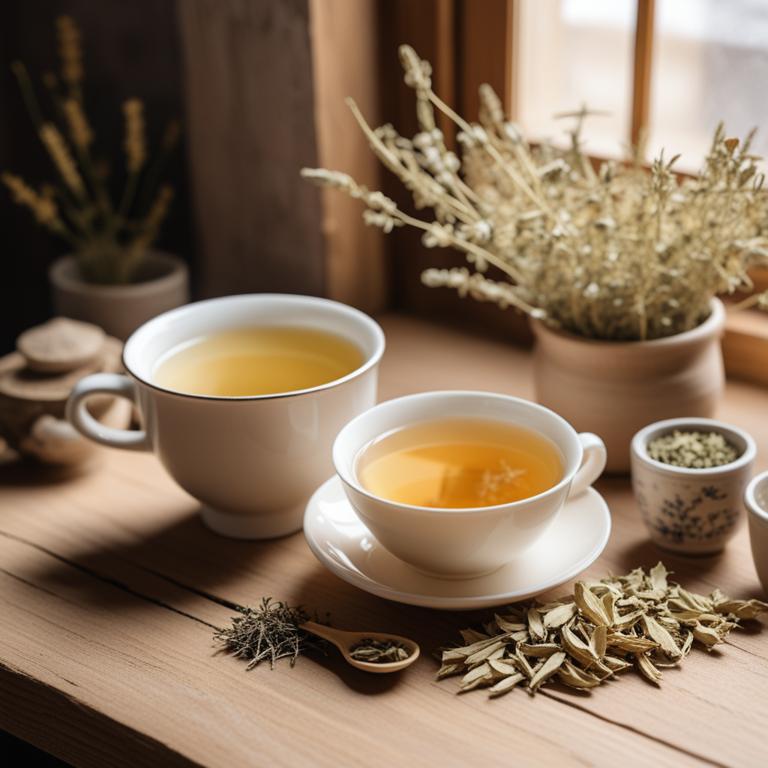
Herbal teas for bone health are a type of non-caffeinated, plant-based beverage that helps to promote and maintain strong bones by addressing conditions such as osteoporosis and osteopenia.
The benefits of herbal teas in treating bone health ailments include reduced inflammation, improved calcium absorption, and enhanced bone density.
Examples of herbal teas used to treat bone health include peppermint tea, which contains menthol that may help to reduce inflammation and improve digestion, thereby aiding in calcium absorption; ginger tea, which has anti-inflammatory properties that help to reduce pain and stiffness in the bones; turmeric tea, which contains curcumin that has potent anti-inflammatory and antioxidant properties; passionflower tea, which may help to reduce anxiety and stress that can contribute to bone loss; dandelion tea, which is rich in calcium and may help to improve bone density; and nettle tea, which is a rich source of calcium, iron, and other essential minerals that support bone health.
By incorporating these herbal teas into their diet, individuals can take a natural approach to maintaining strong and healthy bones.
According to "Experimental and therapeutic medicine", teas for bone health may be beneficial, particularly green tea extract, as it effectively mitigated bone mineral density loss and improved bone microarchitecture in rats when consumed alone or in combination with certain antiresorptive agents.
Below there's a list of the 13 best herbal teas for bone health.
- 1. Equisetum arvense teas
- 2. Astragalus membranaceus teas
- 3. Curcuma longa teas
- 4. Glycyrrhiza glabra teas
- 5. Urtica dioica teas
- 6. Silybum marianum teas
- 7. Angelica sinensis teas
- 8. Sambucus nigra teas
- 9. Matricaria chamomilla teas
- 10. Avena sativa teas
- 11. Taraxacum officinale teas
- 12. Vitis vinifera teas
- 13. Cynara scolymus teas
Also you may be interested in...
TODAY'S FREE BOUNDLE
Herb Drying Checklist + Herbal Tea Shopping List + Medicinal Herbs Flashcards
Enter you best email address below to receive this bundle (3 product valued $19.95) for FREE + exclusive access to The Aphotecary Letter.
$19.95 -> $0.00
1. Equisetum arvense teas
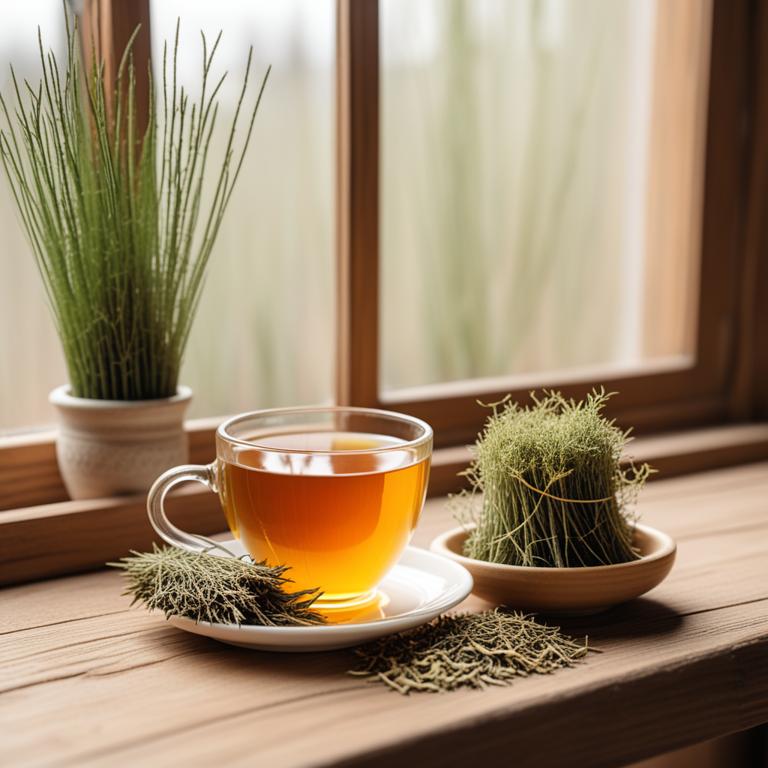
Equisetum arvense teas, also known as horsetail tea, have been traditionally used to treat bone health ailments such as osteoporosis and bone fractures due to its rich content of bioactive constituents.
The tea's high silica content helps to strengthen bones and connective tissue, while its flavonoids and alkaloids promote collagen synthesis and bone density.
The bioactive constituents, including silica, flavonoids, and alkaloids, work together to enhance bone mineralization and prevent bone resorption, thereby alleviating symptoms of bone health disorders.
Regular consumption of Equisetum arvense teas has been found to improve bone health, reduce the risk of fractures, and promote overall well-being in individuals suffering from bone-related ailments.
2. Astragalus membranaceus teas
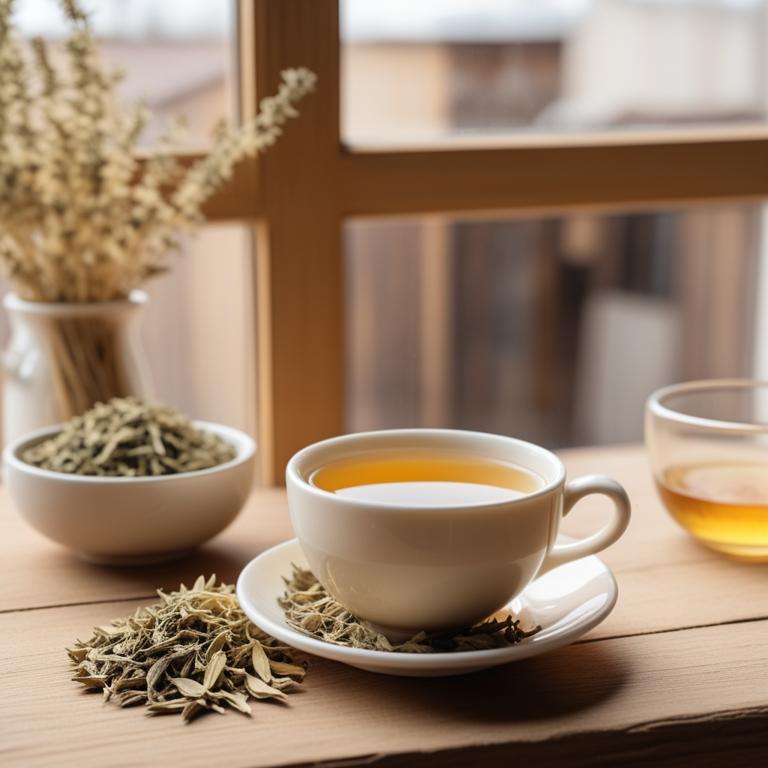
Astragalus membranaceus teas have been traditionally used to treat bone health ailments, such as osteoporosis, due to their ability to promote bone density and improve bone metabolism.
The properties of Astragalus membranaceus teas that help to treat this ailment include their anti-inflammatory, antioxidant, and immunomodulatory effects, which help to reduce bone resorption and increase bone formation.
The bioactive constituents of Astragalus membranaceus teas, including flavonoids, saponins, and polysaccharides, play a crucial role in modulating the body's immune response and promoting bone health.
Regular consumption of Astragalus membranaceus teas has been shown to improve bone mineral density, reduce the risk of osteoporotic fractures, and alleviate symptoms associated with bone health ailments.
Related Study
According to "Frontiers in endocrinology", Astragalus membranaceus teas for bone health may be beneficial as the flavonoid compound astragalin, extracted from this medicinal plant, was found to promote osteoblastic differentiation and bone formation in both in vitro and in vivo studies.
3. Curcuma longa teas

Curcuma longa teas have been traditionally used to treat bone health ailments, such as osteoporosis and arthritis, due to their anti-inflammatory and antioxidant properties.
The bioactive constituents of Curcuma longa, including curcumin, demethoxycurcumin, and bisdemethoxycurcumin, help to inhibit the production of pro-inflammatory enzymes and cytokines, thereby reducing bone degradation and promoting bone formation.
Curcuma longa teas also contain other beneficial compounds, such as flavonoids and phenolic acids, which work synergistically with curcumin to enhance its therapeutic effects.
Regular consumption of Curcuma longa teas has been found to improve bone density, reduce pain and inflammation, and enhance overall bone health, making it a promising natural remedy for the prevention and treatment of bone-related disorders.
Related Study
According to the study, "Curcuma longa" or curcumin significantly increased total hip Bone Mineral Density (BMD) (p<0.001, I^2=0.12), suggesting a potential benefit for bone health.
4. Glycyrrhiza glabra teas

Glycyrrhiza glabra teas, derived from the licorice root, have been traditionally used to treat bone health ailments such as osteoporosis and osteopenia due to their ability to promote bone mineralization and density.
The anti-inflammatory and antioxidant properties of this herbal preparation help to reduce bone resorption and promote bone growth by inhibiting the activity of osteoclasts.
The bioactive constituents of Glycyrrhiza glabra teas, including glycyrrhizin, flavonoids, and phenolic acids, contribute to its bone-protective effects by modulating the activity of osteoblasts and inhibiting the production of pro-inflammatory cytokines.
Regular consumption of Glycyrrhiza glabra teas has been found to improve bone density and reduce the risk of fractures, making it a potential natural remedy for the prevention and treatment of bone health ailments.
Related Study
According to the "Iranian journal of pharmaceutical research : IJPR", Glycyrrhiza glabra teas for bone health may be beneficial as the ethyl acetate extract of licorice root increased proliferation and differentiation of human bone-marrow mesenchymal stem cells, suggesting its potential as a preventive measure for osteoporosis in menopausal women.
5. Urtica dioica teas

Urtica dioica teas have been traditionally used to treat bone health ailments due to their rich content of bioactive constituents such as flavonoids, phenolic acids, and saponins, which exhibit anti-inflammatory and antioxidant properties.
These properties help to reduce inflammation and oxidative stress in the body, promoting healthy bone density and reducing the risk of osteoporosis.
The bioactive constituents of Urtica dioica teas, including diosmin and rutoside, have been shown to improve bone mineral density by inhibiting the activity of osteoclasts, which are responsible for bone resorption.
Regular consumption of Urtica dioica teas has been associated with several benefits, including improved bone health, reduced risk of osteoporosis, and enhanced overall well-being.
Related Study
According to "Indian journal of orthopaedics", Urtica dioica teas have been studied scientifically and have shown promising results in managing osteoporosis and its problems related to bone health.
6. Silybum marianum teas

Silybum marianum teas, also known as milk thistle tea, have been used to treat bone health ailments due to their high content of flavonoids and silymarin, which exhibit antioxidant and anti-inflammatory properties.
These properties help to treat bone health ailments by reducing oxidative stress and inflammation in the body, thereby promoting bone density and reducing the risk of osteoporosis.
The bioactive constituents of Silybum marianum tea, including silybin, silydianin, and silychristin, have been shown to inhibit the activity of osteoclasts, which are cells that break down bone tissue, thereby helping to maintain bone health.
The benefits of Silybum marianum tea in treating bone health ailments include improved bone density, reduced risk of fractures, and enhanced overall bone health.
7. Angelica sinensis teas
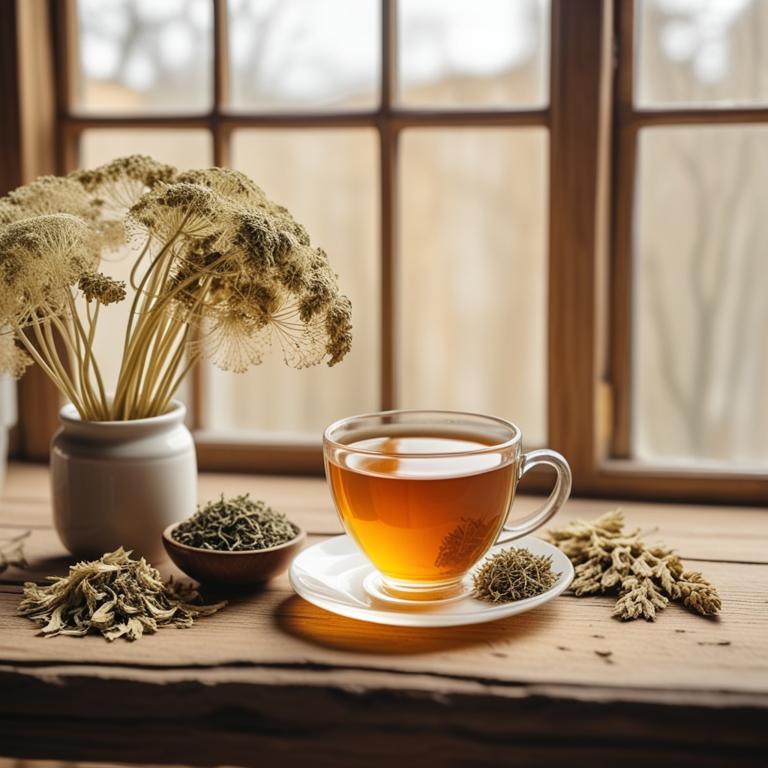
Angelica sinensis teas, also known as dong quai, have been traditionally used to treat bone health ailments, such as osteoporosis and osteopenia, due to their ability to promote bone growth and density.
The bioactive constituents of Angelica sinensis teas, including ferulic acid, feruloylquinic acid, and polysaccharides, help to stimulate osteoblast activity and inhibit osteoclast activity, thereby promoting bone formation and reducing bone resorption.
Additionally, the flavonoids and saponins present in Angelica sinensis teas have anti-inflammatory and antioxidant properties, which help to reduce inflammation and oxidative stress in the body, further contributing to the prevention and treatment of bone-related diseases.
The benefits of using Angelica sinensis teas to treat bone health ailments include improved bone density, reduced risk of fractures, and enhanced overall bone health, making it a promising natural remedy for individuals suffering from osteoporosis and other bone-related conditions.
Related Study
According to "Clinica chimica acta; international journal of clinical chemistry", Angelica sinensis teas for bone health may directly stimulate the proliferation, alkaline phosphatase (ALP) activity, protein secretion and particularly type I collagen synthesis of osteoprecursor cells at a dose-dependent manner.
8. Sambucus nigra teas

Sambucus nigra teas, also known as elderberry tea, have been traditionally used to treat bone health ailments, such as osteoporosis, due to their rich content of bioactive constituents that promote bone density and health.
The properties of Sambucus nigra teas that help to treat this ailment include their antioxidant, anti-inflammatory, and immunomodulatory effects, which help to reduce oxidative stress and inflammation in the body.
The bioactive constituents of Sambucus nigra teas that contribute to their bone health benefits include flavonoids, such as quercetin and kaempferol, and phenolic acids, such as caffeic acid and ferulic acid, which help to stimulate osteoblast activity and inhibit osteoclast activity.
By consuming Sambucus nigra teas, individuals can potentially benefit from improved bone health, reduced risk of osteoporosis, and enhanced overall well-being.
9. Matricaria chamomilla teas
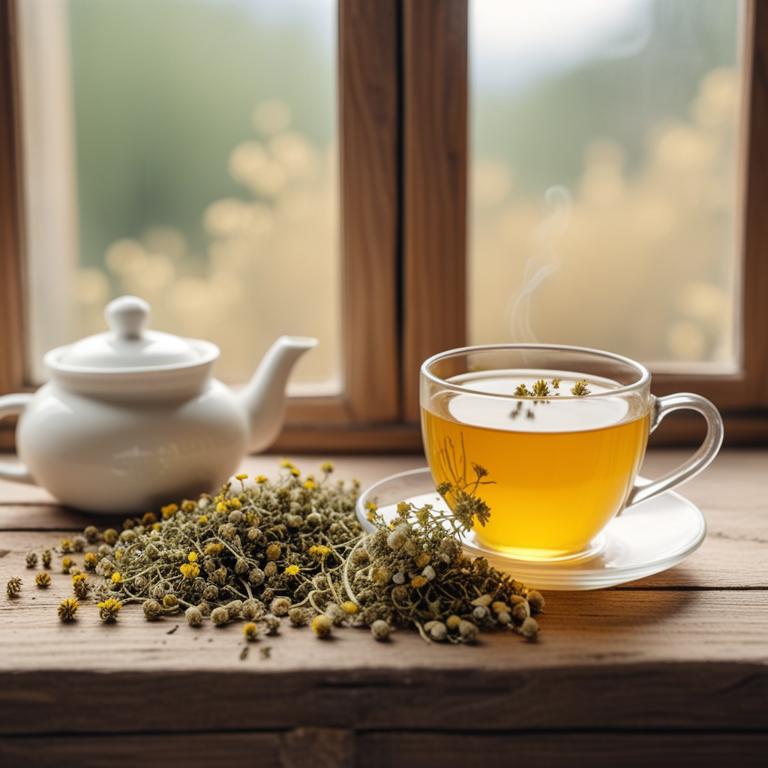
Matricaria chamomilla teas have been used traditionally to treat bone health ailments, such as osteoporosis, due to their anti-inflammatory, antioxidant, and osteoprotective properties.
The bioactive constituents of this herbal preparation, including apigenin, luteolin, and chamazulene, help to reduce inflammation, promote bone growth, and inhibit bone resorption, thereby alleviating bone health issues.
By consuming Matricaria chamomilla teas, individuals may experience improved bone density, reduced risk of fractures, and enhanced overall bone health.
The benefits of this herbal preparation include a natural and non-invasive approach to managing bone health ailments, making it a popular choice among individuals seeking alternative treatments.
10. Avena sativa teas

Avena sativa teas are a natural herbal preparation used to treat various bone health ailments, including osteoporosis and bone fractures.
The properties of Avena sativa teas help to promote bone health by stimulating collagen production, improving bone mineral density, and enhancing bone metabolism.
The bioactive constituents of Avena sativa teas, such as avenacosides and avenanthramides, have been shown to have anti-inflammatory and antioxidant effects, which contribute to their bone-protective properties.
Regular consumption of Avena sativa teas has been found to provide numerous benefits in treating bone health ailments, including reduced risk of osteoporosis, improved bone density, and enhanced overall bone health.
11. Taraxacum officinale teas

Taraxacum officinale teas, also known as dandelion root tea, have been traditionally used to treat bone health ailments such as osteoporosis due to their rich properties that promote bone health.
The tea's anti-inflammatory and antioxidant properties help to reduce inflammation and oxidative stress, which can lead to bone degeneration.
The bioactive constituents present in dandelion root tea, including flavonoids, phenolic acids, and sesquiterpenes, have been shown to stimulate collagen synthesis, promote bone mineralization, and inhibit bone resorption.
Regular consumption of Taraxacum officinale teas has been found to provide numerous benefits in treating bone health ailments, including improved bone density, reduced risk of fractures, and enhanced overall bone health.
12. Vitis vinifera teas
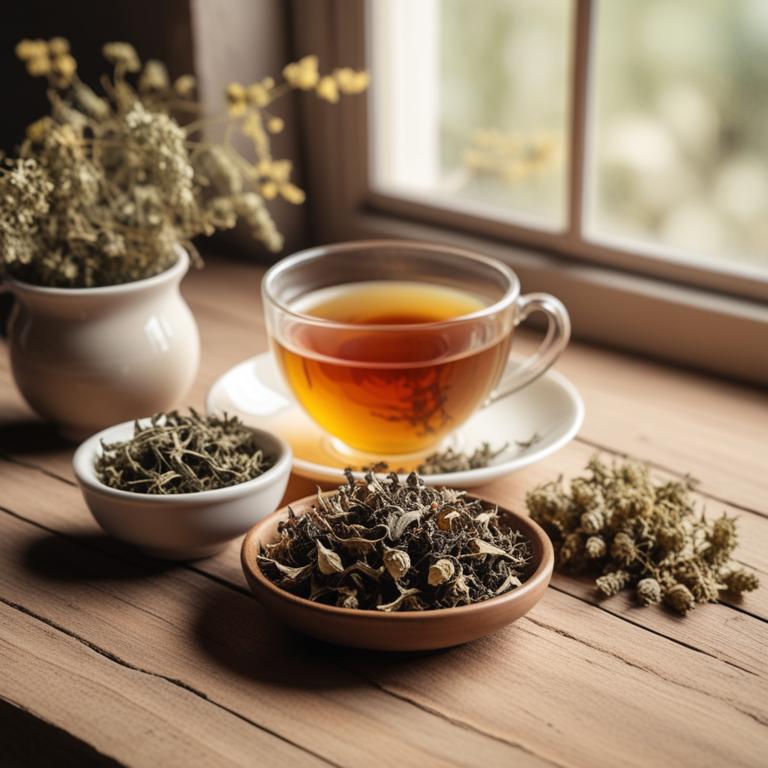
Vitis vinifera teas have been used to treat bone health ailments due to their rich content of bioactive constituents, including resveratrol and anthocyanins, which possess anti-inflammatory and antioxidant properties that help to promote bone health by reducing oxidative stress and inflammation associated with bone diseases.
The anthocyanins present in Vitis vinifera teas help to inhibit the activity of osteoclasts, which are responsible for bone resorption, thereby promoting bone density and strength.
The antioxidant properties of resveratrol and other polyphenols in Vitis vinifera teas also help to protect against bone loss by promoting osteoblast activity and inhibiting the expression of pro-inflammatory genes that contribute to bone degradation.
Overall, Vitis vinifera teas offer a promising natural remedy to treat bone health ailments, such as osteoporosis, by promoting bone density and reducing the risk of bone fractures.
Related Study
According to the study, Vitis vinifera teas for bone health may be beneficial due to the presence of resveratrol, one of its components, which may promote bone regeneration by modulating Ca2+ signaling and inhibiting osteoclast-mediated bone resorption.
13. Cynara scolymus teas
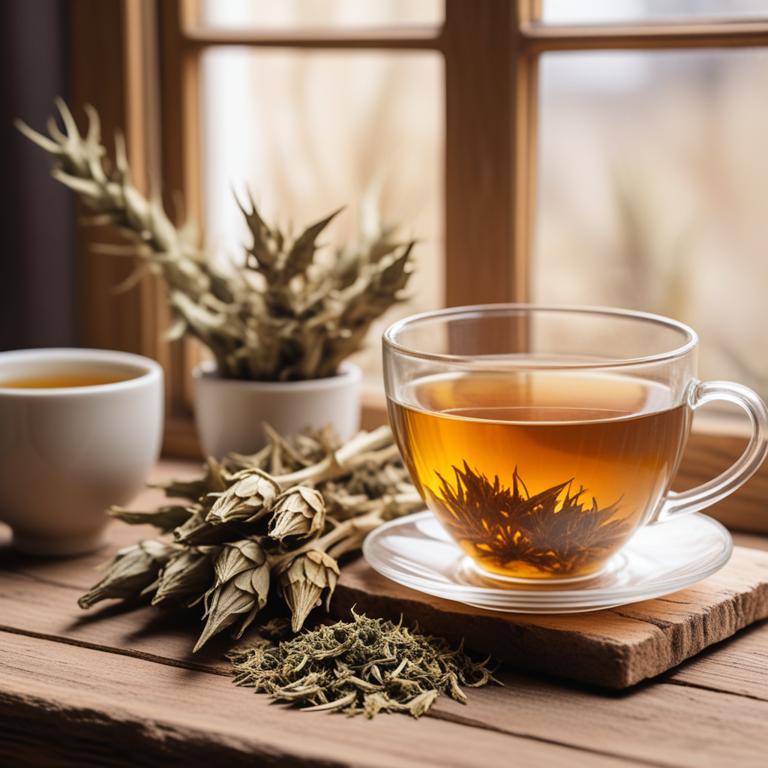
Cynara scolymus teas, also known as artichoke tea, have been traditionally used to treat osteoporosis and other bone health ailments due to its rich content of bioactive compounds.
The tea's antioxidant and anti-inflammatory properties help to protect bone cells from damage and promote bone growth, thereby alleviating symptoms of osteoporosis.
The bioactive constituents of Cynara scolymus tea, including cynarin and silymarin, have been shown to stimulate calcium absorption and inhibit the activity of osteoclasts, the cells responsible for bone resorption.
Regular consumption of Cynara scolymus tea has been found to promote bone density, reduce the risk of fractures, and alleviate symptoms of osteoporosis, making it a valuable natural remedy for maintaining bone health.
Related Study
According to the provided study, Cynara scolymus teas show promising results in treating osteoporosis and promoting bone health, although specific information about its efficacy is not explicitly mentioned.